
Subir Banerjee is an Indian actor who played Apu in Satyajit Ray's Bengali film Pather Panchali (lit. Song of the Little Road, 1955), [1] the first installment of The Apu Trilogy .

Subir Banerjee is an Indian actor who played Apu in Satyajit Ray's Bengali film Pather Panchali (lit. Song of the Little Road, 1955), [1] the first installment of The Apu Trilogy .
During the pre-production of Pather Panchali, Satyajit Ray advertised in newspapers seeking boys between five and seven years of age for the role of Apu. [1] Several boys arrived for audition, but none of them met the expectation of the director. Finally, Ray's wife Bijoya Ray spotted a boy playing on the roof of a neighbouring building of their apartment. This boy, Subir Banerjee, was eventually cast for the role of Apu. [1] Banerjee stayed at Lake Avenue in Kolkata, and later recounted his father's reluctance in allowing him take up the role. That is when Ray said, "Today, no one knows your son or me. But I'll make a film that will change Bengali cinema. Then, all of Bengal will know both of us." This convinced his father, thereafter the shooting continued from 1952 to 1954, with a year's break in between. [2]
Andrew Robinson, in his book Satyajit Ray: The Inner Eye, describes that at the beginning of the shooting of Pather Panchali in 1952, Subir Banerjee was a "decidedly unresponsive actor". [3] The first scene that the crew shot was a scene involving Apu and his elder sister Durga, played by another young actor Uma Dasgupta, walking through a field of kash ( Saccharum spontaneum ) and catching a glimpse of a train. The scene required that Apu walk haltingly, looking for his sister, who had gone ahead. However, Banerjee, without any acting experience, could not enact the halting walk. So the crew had to improvise and place small obstacles in Banerjee's path; also some crew members hid in different parts of the kash field and called Banerjee at pre-arranged times so that Banerjee looks in those directions at times, thereby giving his walk a halting and searching appearance. [3]
The film had interrupted shooting schedules due to funding problems. One long break spanned eight months. Satyajit Ray became nervous, among other things, that the voice of Banerjee, a growing young boy, would break, thereby causing a problem in the continuity of the film. However, this did not happen. [4]
Banerjee did not appear in any film after Pather Panchali. [5] He disappeared from the public eye. India Today , a magazine, tracked him down and published his details in an article, "Pather Panchali: An Odyssey Revisited", in March 1980. [5] At that time, he worked as a millhand in a factory in the suburbs of Kolkata. [5]
According to a report in NDTV, Banerjee became a clerk at a central government office, and later took voluntary retirement. [6]
He is, as of December 2012, 69 years old and "completely detached" from films. [6]
Apur Panchali (2013) is a Bengali film based on Banerjee's life. [6] [7] Director Kaushik Ganguly won the award for best director for Apur Panchali in the 44th International Film Festival of India (IFFI) in November 2013. [8] The director mentioned in an interview that he found similarities between certain parts of the life of Subir Banerjee and the iconic character Apu. [6] In the film, actor Parambrata Chatterjee portrays a younger Subir Banerjee, while Ardhendu Bannerjee plays the role of the aged Banerjee. [9]

The Apu Trilogy comprises three Indian Bengali-language drama films directed by Satyajit Ray: Pather Panchali (1955), Aparajito (1956) and The World of Apu (1959). The original music for the films was composed by Ravi Shankar.

Pather Panchali is a 1955 Indian Bengali-language drama film written and directed by Satyajit Ray in his directoral debut and produced by the Government of West Bengal. It is an adaptation of Bibhutibhushan Bandyopadhyay's 1929 Bengali novel of the same name and features Subir Banerjee, Kanu Banerjee, Karuna Banerjee, Uma Dasgupta, Pinaki Sengupta and Chunibala Devi in major roles. The first film in The Apu Trilogy, Pather Panchali depicts the childhood travails of the protagonist Apu and his elder sister Durga amidst the harsh village life of their poor family.
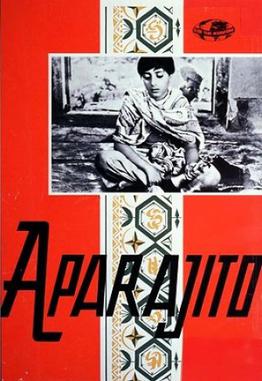
Aparajito is a 1956 Indian Bengali-language drama film written and directed by Satyajit Ray, and is the second part of The Apu Trilogy. It is adapted from the first half of Bibhutibhushan Bannerjee's novel Aparajito. It starts off where the previous film Pather Panchali (1955) ended, with Apu's family moving to Varanasi, and chronicles Apu's life from childhood to adolescence in college.
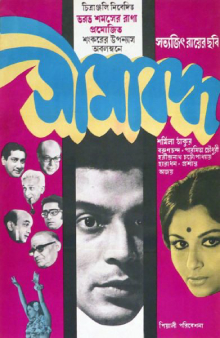
Seemabaddha is a 1971 social drama Bengali film directed by Satyajit Ray. It is based on the novel Seemabaddha by Mani Shankar Mukherjee. It stars Barun Chanda, Harindranath Chattopadhyay, and Sharmila Tagore in lead roles. The film was the second entry in Ray's Calcutta trilogy, which included Pratidwandi (1970) and Jana Aranya (1976). The films deal with the rapid modernization of Calcutta, rising corporate culture and greed, and the futility of the rat race. The film won the FIPRESCI Award at the 33rd Venice International Film Festival, and the National Film Award for Best Feature Film in 1971.
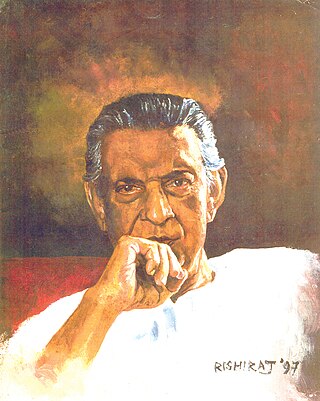
Satyajit Ray was an Indian filmmaker who worked prominently in Bengali cinema and who has often been regarded as one of the greatest directors of world cinema. Ray was born in Calcutta to a Bengali family and started his career as a junior visualiser. His meeting with French film director Jean Renoir, who had come to Calcutta in 1949 to shoot his film The River (1951), and his 1950 visit to London, where he saw Vittorio De Sica's Ladri di biciclette (1948), inspired Ray to become a film-maker. Ray made his directorial debut in 1955 with Pather Panchali and directed 36 films, comprising 29 feature films, five documentaries, and two short films.

Satyajit Ray (1921–1992), a Bengali film director from India, is well known for his contributions to Bengali literature. He created two of the most famous characters in Feluda the sleuth and Professor Shanku the scientist. He wrote several short novels and stories in addition to those based on these two characters. His fiction was targeted mainly at younger readers, though it became popular among children and adults alike.
Subrata Mitra was an Indian cinematographer. Acclaimed for his work in The Apu Trilogy (1955–1959), Mitra often is considered one of the greatest Indian cinematographers.

Karuna Banerjee was a Bengali actress best known for her role in Satyajit Ray's The Apu Trilogy (1955–1959) as the long suffering mother, Sarbajaya. She was nominated for Best Actress at the 1959 BAFTA Awards for her performance in Aparajito (1956), the second part of The Apu Trilogy. She appeared in a number of other films after that, including Ray's Devi (1960) and Kanchenjungha (1962).
Pather Panchali is a 1929 novel written by Bibhutibhushan Bandyopadhyay and was later adapted into a 1955 film of the same name by Satyajit Ray. Considered to be one of the greatest literary works describing rural life, Pather Panchali deals with the life of the Roy family, both in their ancestral village in rural Bengal and later when they move to Varanasi in search of a better life, as well as the anguish and loss they face during their travels.

Satyajit Ray was an Indian director, screenwriter, documentary filmmaker, author, essayist, lyricist, magazine editor, illustrator, calligrapher, and composer. Ray is widely considered one of the greatest and most influential film directors in the history of cinema. He is celebrated for works including The Apu Trilogy (1955–1959), The Music Room (1958), The Big City (1963) and Charulata (1964) and the Goopy–Bagha trilogy.

Cinema of West Bengal, also known as Tollywood or Bengali cinema, is an Indian film industry of Bengali-language motion pictures. It is based in the Tollygunge region of Kolkata, West Bengal, India. The origins of the nickname Tollywood, a portmanteau of the words Tollygunge and Hollywood, dates back to 1932. It was a historically important film industry, at one time the centre of Indian film production. The Bengali film industry is known for producing many of Indian cinema's most critically acclaimed global Parallel Cinema and art films, with several of its filmmakers gaining prominence at the Indian National Film Awards as well as international acclaim.
Kaushik Ganguly is an Indian film director, screenwriter and actor in Bengali cinema. Multiple National Film Awards winner Actor-Director, Kaushik Ganguly is known for making films that explore various aspects sexuality, like Ushnatar Janye (2003), which deals with a lesbian relationship, and Arekti Premer Golpo (2010), which examines transgender identity & Nagarkirtan (2017), an LGBTQ Movie. In 2019, Film Companion ranked Ridhi Sen's performance in Nagarkirtan which was directed by Ganguly, among 100 Greatest Performances of the decade.

Parno Mitra is an Indian actress who appears in Bengali films. Mitra started her career on television. Her acting assignment was Ravi Ojha's Bengali TV series Khela (2007). She was catapulted to stardom after she enacted Ranjana in Anjan Dutta's National Award winning Bengali film Ranjana Ami Ar Ashbona (2011).

Suman Ghosh is a film director, and a professor of economics at Florida Atlantic University.
Feluda is an Indian-Bengali detective media franchise created by Indian-Bengali film director and writer Satyajit Ray, featuring the character, Feluda. The titular character is a private investigator starring in a series of Bengali novels and short stories. The detective resides at 21 Rajani Sen Road, Ballygunge, Kolkata, West Bengal, India. Feluda first made his appearance in a Bengali children's magazine called Sandesh (সন্দেশ) in 1965, under the editorialship of Satyajit and Subhas Mukhopadhyay. His first adventure was Feludar Goendagiri.
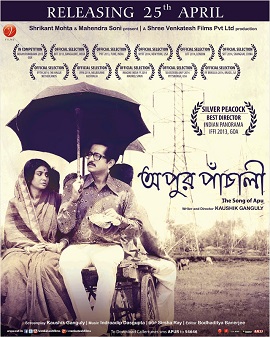
Apur Panchali is a 2013 Bengali film directed by Kaushik Ganguly and produced by Shree Venkatesh Films. It is based on the life of Subir Banerjee, the actor who played Apu in Pather Panchali (1955), the first film of Satyajit Ray's Apu trilogy. Director Kaushik Ganguly won the award of best director for Apur Panchali in the 44th International Film Festival of India (IFFI) in November 2013. The director mentioned in an interview that he found similarities between certain parts of the life of Subir Banerjee and the iconic character Apu. The film uses several minutes of footage from Pather Panchali in its narrative.
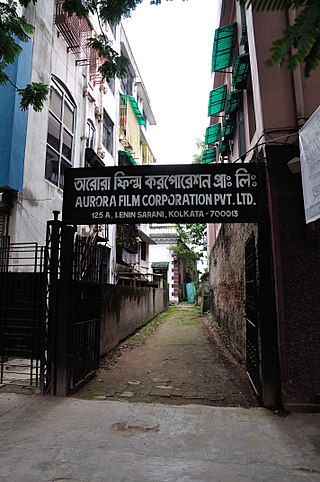
Aurora Film Corporation is a film production company based in Kolkata, West Bengal, India, and primarily involved in producing Bengali films. Aurora has produced and distributed several landmark Bengali-language films including Satyajit Ray's Pather Panchali.
The tar shehnai, also spelled tarshenai or sometimes tar shehanai, is an esraj whose sound is amplified by a metal horn attached to its sound board. The term is also used to refer to the horn itself. The horn of a phonograph has sometimes been used.

Chotoder Chobi is a 2014 Indian Bengali language feature film directed by Kaushik Ganguly. The film stars Dulal Sarkar and Deblina Roy in the lead roles. The film is directed by Ganguly and follows his earlier work on Laptop, Shabdo, Apur Panchali and Khaad. The plot revolves around the lives and opinions of a group of dwarfs who work as jokers in a circus. The film was released on 23 January 2015. Produced by Shrikant Mohta of Shree Venkatesh Films, the film's music was scored by Indradeep Dasgupta. The main cast as well as supporting actors were previously non-actors but Sarkar, one of the lead actors in the film, was awarded the Best Actor award at the 45th International Film Festival of India. It won the National Film Award for Best Film on Other Social Issues.

Aparajito, also known as Aparajito – The Undefeated, is a 2022 Indian Bengali-language biographical film directed and co-written by Anik Dutta. It was produced by Firdausul Hasan and Probal Halder under the banner of Friends Communication, and is based on the making of the film Pather Panchali by Satyajit Ray. The film, being shot in black and white, stars Jeetu Kamal in the title role of Aparajito Ray.